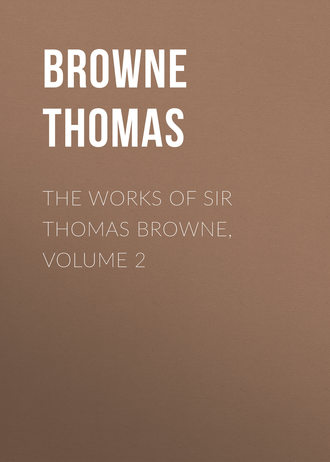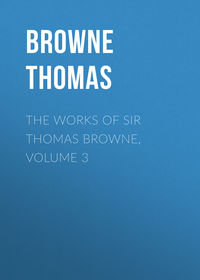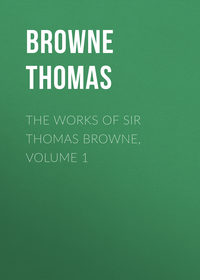 полная версия
полная версияThe Works of Sir Thomas Browne, Volume 2
It is not easie to reconcile the different accounts of longitude, while in modern tables the hundred and eighty degree is more then thirty degrees beyond that part, where Ptolomy placeth an 180. Nor will the wider and more Western term of Longitude, from whence the Moderns begin their commensuration, sufficiently salve the difference. Athan. Kircher. in proœmio. The ancients began the measure of Longitude from the fortunate Islands or Canaries, the Moderns from the Azores or Islands of S. Michael; but since the Azores are but fifteen degrees more West, why the Moderns should reckon 180, where Ptolomy accounteth above 220, or though they take in 15 degrees at the West, why they should reckon 30 at the East, beyond the same measure, is yet to be determined; nor would it be much advantaged, if we should conceive that the compute of Ptolomy were not so agreeable unto the Canaries, as the Hesperides or Islands of Cabo Verde. Robertus Hues de globis.
Whether the compute of moneths from the first appearance of the Moon, which divers nations have followed, be not a more perturbed way, then that which accounts from the conjunction, may seem of reasonable doubt Hevel. Selenog. cap. 9.; not only from the uncertainty of its appearance in foul and cloudy weather, but unequal time in any; When the Moon will be seen on the first day of the change. that is sooner or later, according as the Moon shall be in the signs of long descention, as Pisces, Aries, Taurus, in the Perigeum or swiftest motion, and in the Northern Latitude: whereby sometimes it may be seen the very day of the change, as will observably happen 1654, in the moneths of April and May? or whether also the compute of the day be exactly made, from the visible arising or setting of the Sun, because the Sun is sometimes naturally set, and under the Horizon, when visibly it is above it; Why the Sun is seen after it is set, or naturally under the Horizon. from the causes of refraction, and such as make us behold a piece of silver in a basin, when water is put upon it, which we could not discover before, as under the verge thereof.
Whether the globe of the earth be but a point, in respect of the Stars and Firmament, or how if the rayes thereof do fall upon a point, they are received in such variety of Angles, appearing greater or lesser from differences of refraction?
To what the motion of the Heavens serveth, Met. Lib.
Whether if the motion of the Heavens should cease a while, all things would instantly perish? and whether this assertion doth not make the frame of sublunary things to hold too loose a dependency upon the first and conserving cause? at least impute too much unto the motion of the heavens, whose eminent activities are by heat, light and influence, the motion it self being barren, or chiefly serving for the due application of celestial virtues unto sublunary bodies as Cabeus hath learnedly observed?
Whether Comets or blazing Stars be generally of such terrible effects, as elder times have conceived them; for since it is found that many, from whence these predictions are drawn, have been above the Moon; why they may not be qualified from their positions, and aspects which they hold with stars of favourable natures; or why since they may be conceived to arise from the effluviums of other Stars, they may not retain the benignity of their Originals; or since the natures of the fixed Stars are astrologically differenced by the Planets, and are esteemed Martial or Jovial, according to the colours whereby they answer these Planets; why although the red Comets do carry the portensions of Mars, the brightly-white should not be of the Influence of Jupiter or Venus, answerably unto Cor Scorpii and Arcturus, is not absurd to doubt.
1
Of the cause whereof much dispute was made, and at last proved an imposture.
2
The story of Pigmies rejected.
3
By Pigmies intending Fairies and other spirits about the earth as by Nymphs and Salamanders, spirits of fire and water. Lib. De Pigmæis, Nymphis, etc.
4
Recius, 1650, 1658, 1669, 1672, 1686.
5
villoso, 1646, 1650, 1658, 1669, 1672.
6
Oroetes, 1672, 1686, etc.
7
Zipsias, 1672.
8
geneologie, 1658, 1669, geneology, 1672.



